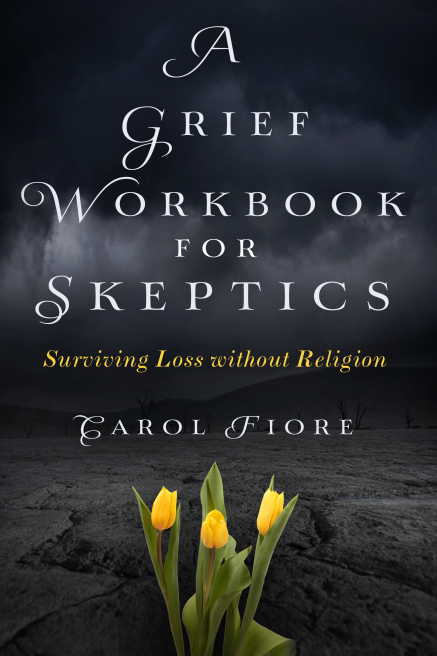After Carol Fiore‘s husband died, she, like so many atheists who have lost a loved one, struggled to deal with the grief because all the resources out there were aimed at religious people.
Now, she’s written A Grief Workbook for Skeptics: Surviving Loss without Religion, a helpful guide for atheists going through the toughest of times, so they don’t feel so isolated.

In the excerpt below, reprinted with permission from the author, Fiore talks about how to respond to words of “consolation” that are really not helpful at all:
Do any of these statements sound familiar?
- God doesn’t make mistakes.
- You won’t get better unless you accept the Lord Jesus Christ into your life.
- God has a plan.
- I’m praying for you.
- Your loved one is in a better place.
- God is testing you.
- There is a reason and a purpose for everything.
- It’s God’s will.
- Come to my church and pray with me.
- God loves the person you lost.
- God is a kind, just, and caring being.
- Your loved one is happier.
- Have faith.
- Put your life in God’s hands.
- It could be worse.
- God never gives us more than we can handle.
There are three main responses to people who say these sorts of things to you: ignore them, fight back, or thank them. What should you do?
I can’t answer that question for you because there is no right or wrong answer, but I can tell you what I did. At first, I thanked people because I was in shock, I knew they meant well, and I was trying to be agreeable. As time went by, I became angry about the comments and fought back. I recall snapping at someone, “Why would a loving God force children to watch their father suffer and die?” Eventually I lost the energy to argue with people.
Here are a few possible scenarios. These are some of my actual responses and, admittedly, may not have been the most appropriate. I went through phases, giving different responses based on different people and different circumstances, sometimes going back and forth between anger and acceptance, between tolerance and intolerance. I hid in the atheist closet for most of my life, only coming out when Eric was in the hospital and, even then, not to everyone. Your friends, perhaps even your family, may not know you’re a nonbeliever. If you prefer to keep it that way, but don’t want to lie or pretend, try the first approach below.
The I-don’t-want-to-argue reply
Religious Person (RP): God has a plan.
Me: Thanks. Please excuse me.
The angry reply
RP: Your husband is in a better place.
Me: A hole in the ground is not a better place.
The nice-but-assertive reply
RP: Things happen for a reason.
Me: I appreciate your concern, but I don’t believe that.
The taking-charge reply
RP: Your husband is with the Lord Jesus.
Me: I respect that you’re religious, but I don’t believe in an afterlife.
The gentle I’m-an-atheist reply
RP: I’m praying for you.
Me: That’s kind, and you’ve been a great friend. I hope we continue to be friends, but I feel I should be honest. I’m an atheist.
The harsh I’m-an-atheist reply
RP: God never does anything without a reason.
Me: I’m an atheist.
The I’m-not-internalizing-your-comment reply
RP: God never gives us more than we can handle.
Me: Okay.
The advice-to-religious-people reply
RP: Your husband is in heaven and you’ll see him again.
Me: I respect your religion, but I’m not a believer. I know you’re trying to help me feel better and I appreciate that, but you need only say you’re sorry.
The somewhat-rude-and-dismissive reply
RP: Things could be worse.
Me: Sure. Whatever.
This next bit of advice is for people trying to help someone through a loss. It’s difficult to know what to say to a friend in emotional pain. Many of us stumble over our words and say the wrong things. We want to help ease the pain, but we know we can’t, so we ramble on and on. Sometimes we say inappropriate things. What everyone, religious or nonreligious, needs to say to someone suffering through grief is simple: “I’m sorry.” Don’t talk about a plan and a better place. Ask what your friend needs. Maybe it’s rides for the kids, meals, or errands. The most comforting thing anyone ever said to me was, “My life was better because I knew your husband.”
I should mention that we have some Atheist Voice videos coming up dealing with this exact topic and they will be posted soon.
A Grief Workbook for Skeptics: Surviving Loss without Religion is now available on Amazon.



It’s Moving Day for the Friendly ..."
It’s Moving Day for the Friendly ..."
It’s Moving Day for the Friendly ..."
It’s Moving Day for the Friendly ..."